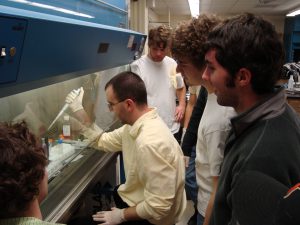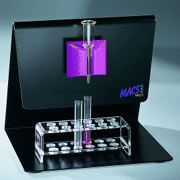Students currently enrolled in Biology 401 – Immunology are conducting research on the induction of dendritic cell maturation by Toll-like receptor ligands. A major theme throughout the Immunology course is the phenomenon of antigen-antibody interactions, including their applications to many areas of immunologic research. During the last two weeks of laboratory work, Dr. Kristian Hargadon has introduced students to MACS technology. MACS, or magnetic activated cell sorting, is a widely used technique in many immunology research laboratories that allows one to isolate specific populations of cells from a complex mixture of cells. The technology relies on the use of antibodies that recognize molecules uniquely expressed by certain cell types. These antibodies are coupled to magnetic beads and bind to a single cell type in a mixture of diverse cells. Following this antigen:antibody interaction, the mixture of cells is placed in a column within a magnetic field, where only those cells bound by the magnetic antibody are retained. Unwanted cells pass through the column, leaving one with the desired cell type in a very pure form. At H-SC, Immunology students are using this technology to isolate dendritic cells from the mouse spleen. While this organ contains anywhere from 100-200 million cells, including B cells, T cells, macrophages, dendritic cells, etc., the students have successfully isolated 4-6 million dendritic cells per spleen in a highly pure population from this mixture. Upon isolating these cells, students are designing their own research projects to analyze the behavior of these splenic dendritic cells in response to exposure to Toll-like receptor ligands. We will keep you posted on their progress!
Biology Department
individually tailored preparation for graduate and professional work


